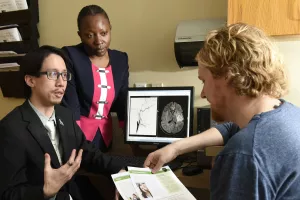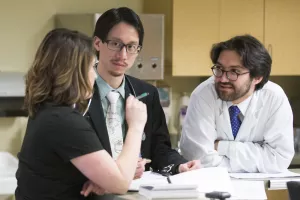When facial weakness and paralysis affect your ability to chew and smile or even impact your appearance, you can turn to our specialists to strengthen facial muscles. Facial nerve paralysis can be something you're born with or be linked to conditions like Bell's palsy, a brain tumor or stroke.
Express yourself again
We use our faces to communicate what we're feeling — a soft smile to show appreciation for a loved one or a furrowed brow because we're upset.
Not only can facial paralysis and weakness make it more difficult to express these emotions, but it can take a toll on your everyday activities like eating, drinking and even blinking. No matter what caused your condition, we'll tailor treatments to help you feel and look like yourself again.

Conditions
Facial paralysis and weakness can happen for a variety of reasons. Some people are born with paralysis, while others deal with it later in life.
Look out for several early warning signs of facial paralysis, like:
- An asymmetric or "crooked" smile
- Eyebrow drooping
- Inability to completely close the eye
- Nasal blockage
- Pain around the jaw or ear
Treating facial paralysis starts with understanding what caused it. Conditions that can cause facial paralysis include:
Treatments
Facial nerve paralysis is often the symptom of another condition, so we'll collaborate with our colleagues in other departments to fully care for your needs.
For moderate paralysis
If your facial paralysis is something that started recently, we'll prescribe steroids and antiviral medications as soon as possible to reduce inflammation and prevent infection.
And if your paralysis prevents you from blinking, we can prescribe eye drops or lubricating ointment to keep your eyes hydrated.
Difficulty closing your eyes can be particularly frustrating at bedtime. We'll share a few tips and tricks you can perform yourself, like eye taping, to help you drift off to dreamland again.
For chronic or severe paralysis
If your facial paralysis persists, we'll work together on a long-term solution to help you look and feel your best.
Injections
The following treatments only take a few minutes to complete and will have you looking and feeling like yourself again in no time:
- Botox® injection for abnormal facial movements or spasms
- Filler injection to restore facial symmetry
Minimally invasive surgery
We can often correct moderate to severe cases of facial paralysis with minimally invasive surgery. These quick outpatient treatments only call for a small incision:
- Eyebrow elevation
- Eyelid laxity tightening
- Eyelid weighting
- Forehead lift
- Static fascia sling of the face
Surgery for facial motion restoration
If you're dealing with severe or permanent facial paralysis, restoring basic functionality is our main goal. In many cases, we can perform surgical procedures that restore facial motion.
If your paralysis began less than 2 years ago, we'll work to transfer or reconnect nearby nerves to the facial nerve to help you do things like chew and use your tongue again.
If the paralysis started more than 2 years ago, we may have the opportunity to take parts of functional muscles from elsewhere in your body and repurpose them for your face. The most common forms of these surgeries include:
- Gracilis free tissue transfer
- Temporalis tendon transfer

From regular office visits to inpatient stays, find the healthcare you need and deserve close to home.

Meet the doctors and care team devoted to supporting you every step of the way along your path to better health.